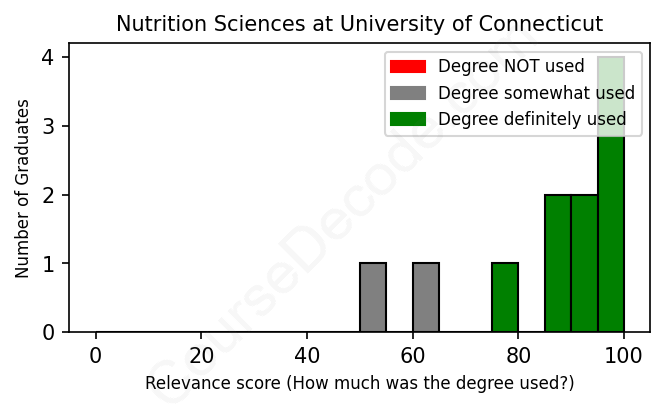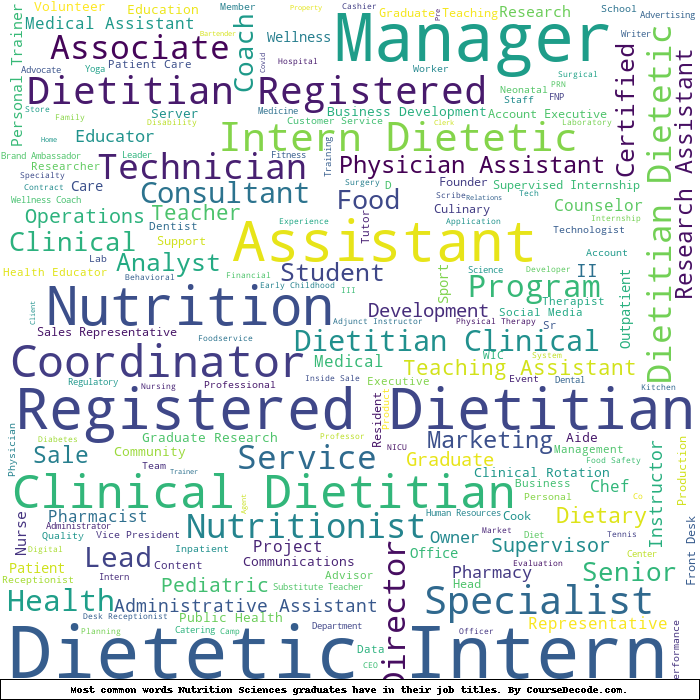
First, some facts. Of the Nutrition Sciences graduates from University of Connecticut we've analyzed , here's how many have used (or NOT used) their degree in their career:

These are estimates based on AI analysis of 11 LinkedIn profiles (see below).
The verdict? Significantly above average. Overall, with an average relevance score of 85%, Nutrition Sciences graduates from University of Connecticut have a much higher likelihood (+18%) of finding work in this field compared to the average graduate across all fields:
And for comparison, here's the chart for all profiles we've looked at across all degrees.
Also, after graduating, 63% of these graduates have pursued further education other than another Bachelor's degree (such as a Masters degree or other), compared to the average across all profiles of 35%. This suggests you may need more than just a Bachelors degree to be competitive as a Nutrition Sciences graduate.
See the details:
|
Relevance score: 90% We think this person has gone into a career highly relevant to their degree. We think this person has gone into a career highly relevant to their degree.
DEGREE INFOGraduated in 2016 from University of Connecticut with a Bachelor's degree in Nutrition Sciences. Also pursued further education since (see below). JOB HISTORY SINCE GRADUATIONSports Performance Intern Northeastern University Jan 2018 - May 2018 Strength And Conditioning Graduate Fellow  Boston College Jan 2019 - Aug 2019 Strength And Conditioning Coach  Teamworks Sports Performance Jul 2018 - Oct 2019 Strength And Conditioning Coach  Northeastern University Sep 2019 - Oct 2021 Movement Coach  BOOM Team Aug 2021 - May 2023 Director of Movement - Boston  BOOM Team Sep 2022 - May 2023 Adjunct Professor  Endicott College Jan 2023 - May 2023 Golf Performance Coach  P4S Golf May 2023 - Present FURTHER DEGREES DONE SINCE GRADUATINGMaster of Science - MSMerrimack College 2019 - 2019 ABOUTExperienced Strength And Conditioning Coach with a demonstrated history of working in the higher education industry. Skilled in exercise and program design, sports performance, testing analysis, and nutrition education. Strong education professional with a Master of Science focused in Exercise and Sport Science from Merrimack College |
The top 10 most common jobs done by the graduates we've analyzed (ranked most common to least) are:
When looking at the career paths of people who graduated with a degree in Nutrition Sciences from the University of Connecticut, it seems that many have found their way into jobs that really connect back to their studies. The most common roles they’ve held include positions such as Clinical Dietitian, Dietetic Technician, and various roles in regulatory affairs related to nutrition and food safety. These positions typically require a solid understanding of nutritional knowledge and skills that the graduates learned during their time in school. For instance, Clinical Dietitians and Dietetic Technicians frequently use their education to assess dietary needs and develop meal plans for patients, which is pretty much a prime example of applying what they studied in a real-world setting.
On the flip side, not every position these graduates ended up in is directly relevant to their Nutrition Sciences degree. Some have taken on roles that are more about management or customer service rather than hands-on nutritional work, like being a Dining Room Manager or a Supervisor at a café. While they might have some benefits from their background in nutrition, those jobs don’t require the depth of knowledge that other positions do. Overall, it looks like a good chunk of UConn Nutrition Sciences grads have landed roles that really tap into their educational background, particularly those focused on clinical and regulatory areas, while others have branched out into different fields where their specific studies aren’t always utilized. It gives a mixed bag but leans towards a positive take on how they’ve integrated their degrees into their careers.
Here is a visual representation of the most common words in job titles for Nutrition Sciences graduates (this is across all Nutrition Sciences graduates we've analyzed, not just those who went to University of Connecticut):

Graduates from the Nutrition Sciences program at the University of Connecticut have generally charted solid career paths that relate directly to their field of study. Many of them land their first jobs shortly after graduation in roles like nutrition assistants, dietetic technicians, or even entry-level positions in regulatory affairs within food companies. It's clear that the early years after graduation are typically spent gaining practical experience, often in clinical settings or roles that provide valuable hands-on learning opportunities. For instance, one might start as a nutrition assistant and then work their way up to roles like clinical dietitian or patient services manager, which shows a nice progression in responsibilities and skills related to nutrition.
Fast forward 5 to 10 years, and you’ll see many of these UConn graduates have moved into more advanced positions like clinical dietitians at prominent healthcare facilities or even specialty roles such as renal dietitians or clinical nutrition coordinators. Some have ventured into academia as adjunct professors, while a few have branched out into adjacent fields like sports performance and strength coaching. Overall, many have managed to secure roles that are clearly aligned with their nutrition background, indicating that not only do these graduates start strong, but they also tend to grow and succeed in careers closely related to nutrition sciences. So, if you're considering this path, it looks pretty promising! Just be prepared to work hard and continuously build your skills along the way.
Honestly, a Bachelor’s degree in Nutrition Sciences can be pretty challenging, especially at a university like UConn, which has a reputation for strong academics. You'll dive into subjects like biology, chemistry, and even some advanced nutrition courses that require a good bit of memorization and critical thinking. It’s not just about eating healthy; you’ll learn about the science behind nutrients and how they affect the body, which can get pretty complex. That said, if you’re passionate about food and health, you’ll probably find it rewarding—even if it’s tough at times. Overall, it’s about average on the difficulty scale, but if you stay organized and keep up with your studies, you can totally handle it!
Most commonly, in the LinkedIn profiles we've looked at, it takes people 4 years to finish a Bachelor degree in Nutrition Sciences.
Looking at the career paths of these UConn nutrition graduates, it seems like they've been doing pretty well for themselves, especially the ones who landed roles like Clinical Dietitian and Regulatory Manager. The earlier grads from 2011 and 2015, for example, moved up to higher-paying positions in reputable companies, which suggests they’re likely making decent salaries now. However, some of the more recent grads, especially the ones still in entry-level or assistant roles, might not be raking in the big bucks just yet. Overall, though, it looks like there's a solid earning potential in the nutrition field, especially as they gain more experience and find their niche.
Here is a visual representation of the most common words seen in the "about" section of LinkedIn profiles who have a Bachelor degree in Nutrition Sciences (this is across all Nutrition Sciences graduates we've analyzed, not just those who went to University of Connecticut). This may or may not be useful:

Here are all colleges offering a Bachelor degree in Nutrition Sciences (ordered by the average relevance score of their Nutrition Sciences graduates, best to worst) where we have analyzed at least 10 of their graduates:
| College | Score | Count |
|---|---|---|
 University of Connecticut University of Connecticut
|
85 | 11 |
 Penn State University Penn State University
|
76 | 13 |
 California Polytechnic State University-San Luis Obispo California Polytechnic State University-San Luis Obispo
|
75 | 12 |
 University of New Hampshire University of New Hampshire
|
71 | 10 |
 Arizona State University Arizona State University
|
70 | 12 |
 Texas A&M University Texas A&M University
|
70 | 19 |
 The University of Texas at Austin The University of Texas at Austin
|
60 | 21 |
 Montclair State University Montclair State University
|
59 | 10 |
 Kaplan University Kaplan University
|
54 | 12 |
 University of Arizona University of Arizona
|
46 | 20 |